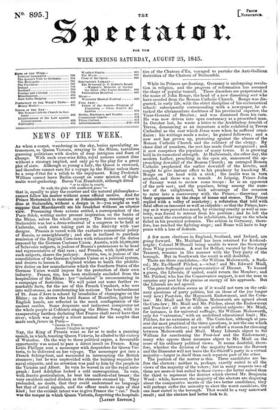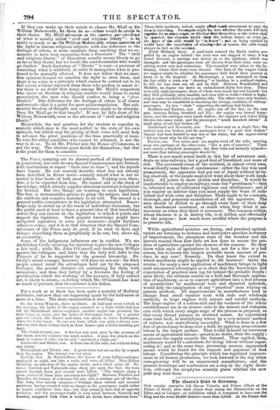A few more elections in England, Scotland, and Ireland, are
going. forward. Mr. Maitland has been returned for Kirkcud- A few more elections in England, Scotland, and Ireland, are going. forward. Mr. Maitland has been returned for Kirkcud- bright; Colonel McDouall being unable to wrest the Stewartry from Whig possession. A seat for Belfast, vacated by Sir James Tennent, remains in like manner with the Tory party of the borough. But in Southwark the result is still doubtful. There are three candidates,—Sir William Molesworth, a Radi- cal; Mr. Ex-Sheriff Pilcher, a—what ? and Mr. Edward Miall, a Complete Suffragist and representative of Dissent. To hazard a guess the Liberals, if united, could return the Member ; and Mr. Pilcher who has the Conservative support, is not the man to surprise any post by the genius or energy of his approach. But the Liberals are not agreed. The present election seems as if it would not turn on the ordi- nary questions of party politics, but on those of the (no longer very new) Poor-law, the Maynooth Endowment, and the Corn- law. Mr. Miall and Sir William Molesworth are agreed about the Corn-law ; Mr. Miall and Mr. Pilcher, about the Endowment and Poor-law; all are at odds on political subjects : Mr. Miall, for instance, is for universal suffrage; Sir William Molesworth, only for "extension," with an undefined educational limit ; Mr. Pilcher, for no extension at all. The Corn-law, although at pre- sent the most practical of the three questions, is not the one which most sways the electors; nor would it afford a reason for choosing
between Molesworth and Miall. Many Liberals object to Sir William for sanctioning the Poor-law and the Endowment; many who oppose those measures object to Mr. Miall on the• score of his ordinary political views. It seems doubtful, there- fore whether the division of the majority between the Baronet and Dissenter will not leave the Ex-Sheriff's party in a virtual majority—larger in itself than each separate part of the other.
The position of the matter is this. Three candidates are be. fore the electors : neither is, perhaps, exactly suited to all the views of the majority of the voters ; but in many respects two of them are more or less suited to those views—far better suited than the third to represent the district which elected Mr. Benjamin Wood : while, however, the majority of the electors are disputing about the comparative merits of the two better candidates, they will perhaps suffer the minority to elect the worst candidate, the one least suited to the borough. That would be a very untoward result ; and the electors had better look to it.
If they can make up their minds to choose Mr. Mia11 or Sir William Molesworth„ let them de so,--either would. do credit to their choice. Mr. Mien advances as the assertor potr theellentr‘ of what is usually ,called "civil ,and, religions libetty" : is hp really so much so as-Sir William Moleswarth, whose-assertioo of the right to discuss religious subjects, with due deference to the feelings of others, is more emphatic than anything that we re- member to have seen emanating from a Dissenter ? The "civil and religious liberty" of Dissenters usually means liberty to go as far as they desire, but wo betide the controversialist who would go further. Such limitation of " liberty " is cant--a pretence of conceding what is withheld, in order to monopolize what is pro- fessed to be mutually allowed. It does not follow that we sanc- tion opinions because we sanction the right to utter them' and there is no value in a principle which cannot be carried out to its full extent without reproach from those who profess to assert it : yet there is no doubt that many among Mr. MialPs supporters who insist on freedom in religious matters would doom to social proscription the man who should confess to being a "free- thinker." Due deference for the feelings of others is of course understood—that is a point for mere police-regulation. But sub- stantial freedom of thought and conscience ought to be absolute. Does Mr. Miall go to that length ? If not, he falls short of Sir William Molesworth, even as the advocate of "civil and religious liberty." Meanwhile, the real question for the electors to consider is, scarcely which man is the most perfect in the state of his own opinions, but which way the giving, of their votes will most help to advance the great questions of the time practically at issue. To vote for either candidate who cannot be returned, is not the way to do so. To let Mr. Pilcher into the House of Commons, is Dot the way. The electors must decide for themselves; but that is the point for them to consider.



























 Previous page
Previous page